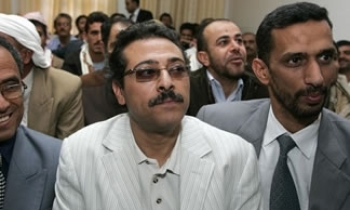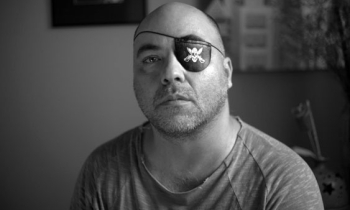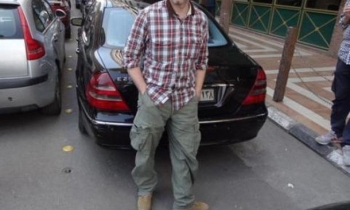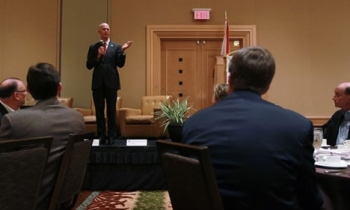There is in Venezuela, as people of all shades of opinion broadly agree, freedom of expression. You have only to open an opposition newspaper, or turn on the TV, to realise that criticising the government is not merely permitted but exercised in full.
That, however, is where the consensus ends.
From the government's perspective, the opposition media are abusing this freedom to spread lies in a bid to destabilise the radical leftist regime of President Hugo Chávez, the army officer who led a failed military coup in 1992 before coming to power through the ballot-box in 1998.
It is a view enthusiastically endorsed by foreign solidarity groups, leftwing commentators, and even by the secretary-general of Britain's National Union of Journalists, Jeremy Dear, who after a trip to Caracas in June 2006 accused the media of "churning out anti-Chávez propaganda".
Dear has promised "a pan-European campaign" to refute what he sees as opposition lies, parroted by the foreign press. His views are virtually indistinguishable from those of the Venezuelan government, and sharply at odds with those of international press-freedom watchdogs.
The media and the people
The Venezuelan opposition says restrictive new laws and official harassment of journalists and media organisations are clear signs that the government's ultimate aim is to outlaw many forms of criticism. Sometimes, indeed, that aim is made alarmingly explicit by the only man whose opinion really counts – the president himself.
One recent instance of this was in mid-June. The scene was the parade ground of Fort Tiuna, the sprawling military headquarters in Caracas. Dressed in olive-green military fatigues and a paratrooper's red beret, Chávez was formally handing over to the army the first of 100,000 new Kalashnikov assault rifles, supplied by Russia.
Unexpectedly – although clearly not spontaneously, and not for the first time – the president suddenly launched a fierce attack on the private TV networks. They were, he said, using publicly-owned airspace to attack "the people" and divide Venezuela.
Announcing that he had ordered a review of the channels' licences, with a view to revoking them if the law had been broken, Chávez declared that a small group of people (the media owners) were engaged in a United States-financed campaign of "psychological warfare, to divide, weaken and destroy the nation".
The fact that Chávez donned a military uniform, used a military installation and held an assault weapon while announcing a review of TV concessions sent a message the TV bosses received loud and clear.
"It's like he's holding up a yellow card", said Alberto Federico Ravell of the twenty-four-hour news channel Globovisión, "so that the TV stations behave themselves in an election year." (Chávez is a candidate for a further six-year term in the 3 December 2006 presidential elections.)
Globovisión, along with RCTV – another of the four main terrestrial channels that Chávez dubbed "the four horsemen of the Apocalypse" – has long been in the crosshairs.
During the 2001-04 political crisis, in which political polarisation reached its height, these TV stations openly sided with the opposition.
After an April 2002 coup briefly ousted Chávez, the news channels barred his supporters from the airwaves and showed cartoons in place of the pro-Chávez demonstrations which helped restore him to power.
In 2005, they played a key role – often behind the scenes – in coordinating a two-month business stoppage which paralysed the vital oil industry, the motor of the economy, in a further bid to topple the president.
One of their least appealing features is their occasional use of genuine information, gathered by journalists in the course of their work, as a political or legal weapon in the struggle between them and the government.
The other story
But local and international human-rights monitors disagree with the government that such practices justify what the Sindicato Nacional de Trabajadores de la Prensa (Venezuelan journalists' union / SNTP) has called "a climate of aggression and threats against media and journalists", much of it conducted personally by the president.
These are some of the criticisms voiced in the past eighteen months by human-rights and press-freedom bodies:
* "By broadening laws that punish disrespect for government authorities, the Venezuelan government has flouted international human rights principles that protect free expression." (José Miguel Vivanco, Americas director of Human Rights Watch, 24 March 2005)
* "[T]he Chávez administration moved towards institutionalised repression and new legal restraints against the press" (Committee to Protect Journalists, 2005 report)
* "The political and media battle in Venezuela between supporters and opponents of President Hugo Chávez seemed to calm down in 2005, but this was mainly due to new measures restricting the media" (Reporters Without Borders, 2005 report)
* "[T]he Commission stated its concern [..over..] the promulgation of laws that affected freedom of expression; the increase in instances of criminal proceedings against journalists […] and the intimidation, attack, harassment and detention of journalists by military personnel…" (Inter-American Human Rights Commission, 2005 report)
The government dismisses all such criticism as United States-inspired propaganda, pointing out that assaults on journalists are less frequent than at the height of the political crisis, and that reporters for government media are also occasionally attacked.
While this is true, attacks on the press have certainly not ceased. In April 2006, photographer Jorge Aguirre was shot dead in an unprovoked attack, apparently by a policeman riding a motorcycle with no licence plates, as he prepared to photograph a demonstration.
The case of another photographer, Jorge Tortoza, who was killed while covering the 11 April 2002 demonstration that helped (temporarily) remove Chávez from power, has never been resolved.
The shooting to death of journalist and town councillor Mauro Marcano, murdered in September 2004 by hired gunmen in the eastern city of Maturín is also unsolved. A national-guard general, named by a parliamentary commission as a suspect, has never been publicly investigated.
It is a commonplace of "solidarity" journalism that the government is at a disadvantage, in that "95%" of the media is in opposition hands (see, for example, here and here and here and here), although quite what this figure is supposed to be measuring is unclear.
The president's show
In fact, the government directly controls four TV channels of its own, including Telesur – Chavez's answer to CNN – as well as a large number of radio stations. The biggest-selling national daily (Ultimas Noticias) is sympathetic to the regime, which also controls another daily (Vea) and a variety of other print media.
State media make only token attempts at balance, and dissident voices are kept to a minimum. The miners' leader Rafael Madero, from the eastern state of Bolívar, recently discovered this when he asked for airtime on VTV (the main state channel) to criticise a proposed mining law. "The lady I spoke to said, 'I can't give you any access if you're going to criticise the minister'", said Madero, a longtime Chávez supporter.
State radio and TV carry a live Sunday programme, Aló Presidente (Hello, President), hosted by Chávez, which starts and ends whenever he likes; its duration is routinely between five and seven hours.
Moreover, the president can – and frequently does – interrupt all radio and TV broadcasts at a moment's notice and for as long as he likes. He often uses these so-called cadenas (literally "chains") to broadcast overtly political messages.
The Consejo Nacional Electoral (national electoral authority / CNE), has decided to place no special restrictions either on the Sunday programme or the cadenas during the 2006 election campaign, giving the president a massive propaganda advantage.
The 1999 constitution, introduced by Chávez, protects freedom of expression; for instance, it specifically outlaws prior censorship. But a recent judicial order, banning certain types of press coverage of a sensitive political case, is just one sign that such guarantees are by no means watertight.
With many other areas of national life already subject to strict government control, journalists in Venezuela – local and foreign – are, understandably, waiting for the other shoe to drop.









